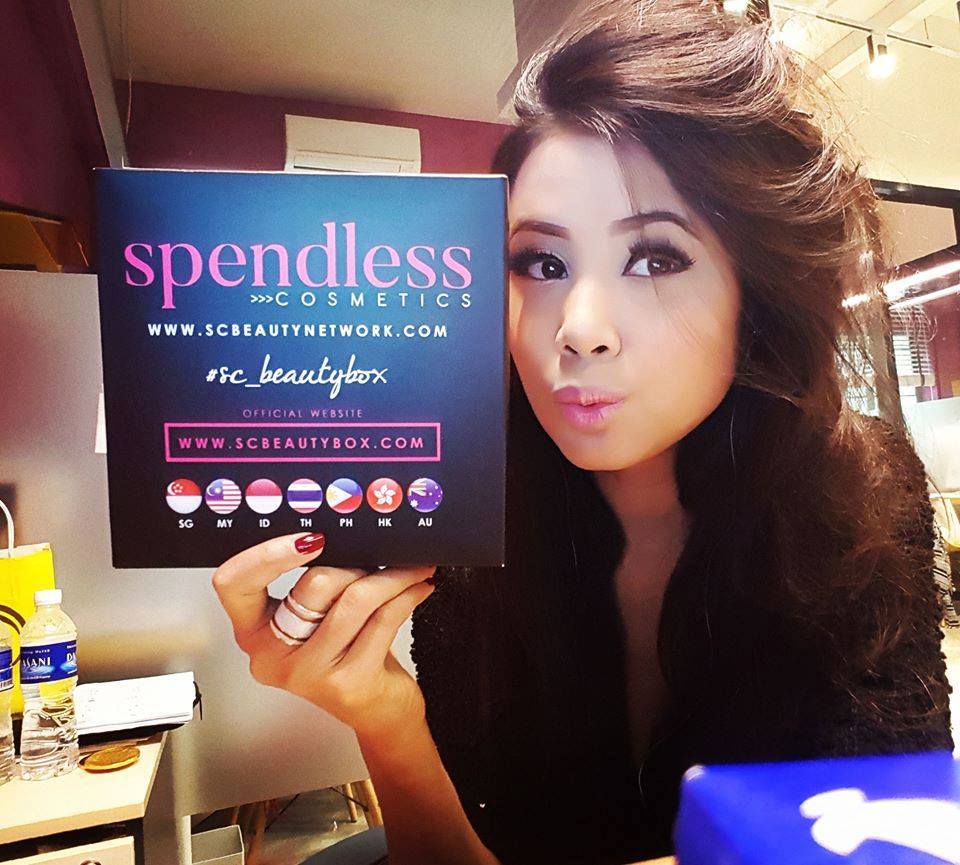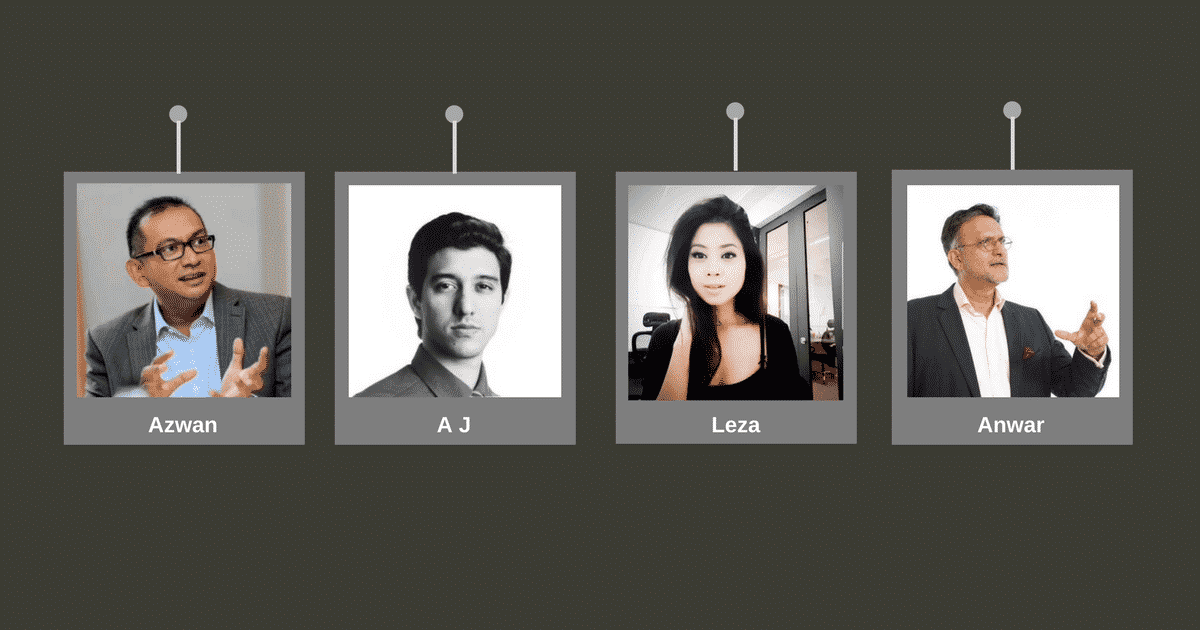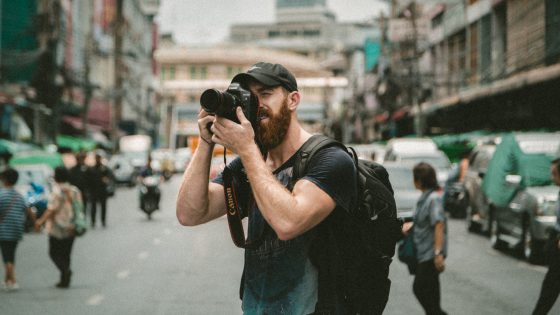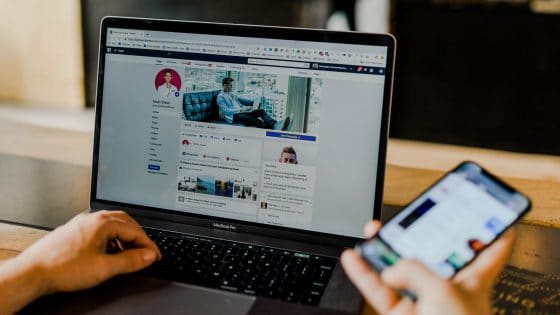LinkedIn matters. That’s my personal take. I said so because everything that I’ve experienced here on LinkedIn are all positive ones. I’ve shared my real-life professional journey, thoughts and opinion about those through my posting. I’ve been a power user myself since ages ago which exact year I can’t even remember.
With LinkedIn, not only I’m able to speed up the monetisation of my personal brand but also make a number of good friends as well. Yet, a number of people out there are quite skeptical with it. They claimed that it worked great for me and not for them. They said that they’ve tried many ways but the outcome isn’t that great.
Lets forget about me. Forget about my stories. I am going to share with you stories from these 4 LinkedIn personalities about this. Last week I sent across a set of written questions to the Country Managing Director of Accenture Malaysia Azwan Baharuddin, Co-Founder of Xtrategize and TEDx SpeakerA J Minai, Group CEO of Spendless Beauty Leza Parker and Business Coach and Published AuthorAnwar Jumabhoy, seeking their thoughts on this topic.
To my eyes, these four people are the real LinkedIn power profiles. They can be seen on LinkedIn almost everyday, sharing positive thoughts consistently and at the same time inspire me and thousands of their followers to evolve and follow their successful footsteps. These are rare mentors, and if you say that you never heard of them, then my advice is, it’s about the damn time to get to know them closely.
I received these feedbacks from my four questions sent. Their answers here will inspire you. Read on.
Does LinkedIn matter to your professional journey, and why is that?
Azwan Baharuddin: Yes it does. It is a tool that allows me to quickly build a network of people that are not normally in my own personal and professional circles. It is also a platform that allows me to be whomever I want or whatever I want from a branding perspective – almost instantly.

Credit: Digital News Asia | Azwan Baharuddin
A J Minai: LinkedIn matters a lot. It plays a significant role within my professional life. Not to mention that it even plays a role in my personal life too. How? Well it’s essentially about three components for me. (a) Inspiration, (b) Connection, (c) Learning. All in that order by the way!
Despite what several others online today are saying about how content quality is rapidly dropping on our LinkedIn feeds, I feel like LinkedIn is still very much a repository of real gems in terms of knowledge. The difference lies in the eyes that seek what they want to seek, or what they want to see. Yes, there’s no denying that there are increasingly more posts on LinkedIn that aren’t necessarily appropriate for the platform given its business-centric disposition. But why not just ignore those posts? Why keep emphasising on those particular posts? Why keep emphasising on whether or not this post’s content is appropriate for this forum or not?. Instead of expending our energies and views uselessly, why not recalibrate ourselves and our eyes to actively “seek” out those real gems of knowledge.
I don’t mean to boast, but this is what I’ve done to an extent in my own views of LinkedIn. Call it simplistic, but I feel that there are essentially two types of people in this world. The “active” who intentionally seek what they need in order to grow, and the “passive” who more often than not, stumble across those moments in which they grow. Neither is wrong or right. The comparison is more “effective or not-effective”.
Anyways coming back to why LinkedIn matters to my professional journey. Because through “actively” seeking out the real gems of knowledge – it provides me with (a) Inspiration. Something that I can’t put a price tag on, neither can I really provision a metric around how inspired I am in any given moment. But what I do know with certainty is that being inspired by other’s posts, their articles, etc. It spurs something within us to be a better version of ourselves. It motivates us to take action when we are inspired. In this case, I can relate as in the beginning, I myself saw other’s posts and they inspired me to start being more active on LinkedIn.
This brings me to (b) Connection. Through inspired posts repetitively showing on my LinkedIn feed. I then begin to engage and take notice of who these individual LinkedIn profiles are who consistently inspire me with their words and thoughts. This often leads to either me or them, messaging one another with words of gratitude or curiosity. From there, a “connection” is formed. Both online via LinkedIn in terms of adding one another to each other’s network, and offline too – often resulting in catching up over a cuppa coffee or a skype call if there’s too much distance in between. The connection may often lead to a host of mutual benefits (business opportunities, referred customers, event invitations, etc) for both profiles, but more than anything else — if you ask me, it leads to something that I value over all else, which is (c) Learning.
A connection is merely the beginning. Often people underestimate the psychological impacts of “connecting” and “engaging” with others on LinkedIn. Especially is you follow them often in terms of their postings & articles, etc. It’s essentially the trust and credibility that builds up in our minds as we “connect” with another who “inspires” us.
Isn’t true that we often learn with a more open and amicable mindset from those we respect and look up to? Isn’t it true that we often find it easier buying something from someone we like as opposed to dislike?
Don’t get me wrong though, LinkedIn has been a powerful tool for me in terms of business opportunities & referrals – however that isn’t the only professional value it brings to my life. However, learning perpetually from these inspired connections to add to myself, to grow as a person both professionally and personally is priority & value for me above and beyond the business opportunities, referrals, ROI, invitations and so on.
Leza Parker: Yes, it is important for my business. The connections I acquire on LinkedIn lead me to my suppliers, partners, employees, customers and investors. Without these connections, my company will not be able to scale globally fast enough.
Anwar Jumabhoy: We all have a personal brand, which comes from our values and the way we conduct ourselves. LinkedIn gives you a platform to express what we think, what we speak about and our interests. It is, therefore, an integral part of our personal brand. In a digital world, where information is captured – almost permanently – our words “stick” with us and become part of our personal brand.

Credit: Anwar Jumabhoy
From your professional experience, do you think LinkedIn can really help to convert one’s reputation into a personal brand, and what does it take to make that happens?
Azwan Baharuddin: Absolutely. LinkedIn is the only professional networking platform that enables you to do just that. Building a personal brand is all about being known for something or if you are really good, about everything – though it is much harder to get there unless you are successful like Richard Branson and many others who who have achieved great personal and career success. Primary reason for this is because,
- It is a global platform not limited by geography, sector or interests, political or otherwise.
- It is open and allows just about anybody to access and comment on your thoughts and opinions you post.
- You can share almost anything, professional related of course.
- You can share as often as you like, even if the content is not yours to begin with and Five. Originality is not a prerequisite, you don’t have to invent new things or points of views
What does it take? Well, a few things I think. Am not an expert, and as many others out there we learn new things every day:
- Have a theme you want to own – a topic you are passionate about or believe in strongly. In my case is about educating Malaysians about digital and owning the corporate (Malaysia) digital agenda
- Share often – make sure it is along the theme you decided. But don’t just fire and forget – make sure you articulate either 2 liner executive summary for readers or put up a question or two that will get people thinking
- Get better at the content you are sharing, meaning that while you can have broad themes, there will be one or two sub topics that you are more passionate about. Find content that is relevant to your cause – real
- Read other people’s postings and comment as well. Agree or disagree. Explain why. Share facts and figures if possible (everybody wants to learn something). Don’t just sit on the fence – nobody likes them
- Be charming in your responses or posting. Or at least witty and smart. Saying “Agreed” means nothing to most people, except the author (who feels good for a few seconds)
- Be absolutely controversial once in awhile. Not all the time, create a big discussion thread that you know polarises readers – like “Liverpool FC will never win a trophy again”. A hoard of LFC fans will come and defend their club, while other will come and tell you why it’s true. But not all the time.
- Think about the characteristics of your brand, meaning are you going to be known as the one who responds quickly, provides data for every response, best at contextualising situations, charming, terse, full of graphics (or infographics), if good looking, always posting your own pictures because that’s part of the charm, best one liners? etc. Many more to choose from. Make sure people can describe your personality even without having ever met you.
A J Minai: LinkedIn can do absolutely amazing things for one’s personal brand; on the condition THAT you know how and what you are doing. Many of us believe that building a personal brand is either posting officious content regularly or copying someone else’s content and re-posting that. Both are very far from what it takes to truly build your personal brand. In a nutshell, building a personal brand entails the following:
- Goal-setting: What do you stand for? What is your purpose? Define that purpose in one or two very powerful sentences. These sentences are not for your LinkedIn profile. These sentences are for you to constantly remind yourself what your single most critical mission is, professionally.
- Stories: Once you’re clear on what & who your persona stands for? You build “stories”, not posts, not research, not memes, etc – you build stories that inspire, NOT sell. These stories don’t always have to be about you and your life. They can be about others who inspired you. However what I’m emphasising on here is “storytelling” and how underestimated it is among most of us, especially within the corporate world. Once you’ve created these stories, you may use them in a variety of formats (videos, blogs, posts, etc) to inspire others. While inspiring others with your stories, your intent should be to create credibility & value, not just a sales-pipeline or revenue.
- Consistency: Different people will have a different take on what “consistency” means on LinkedIn or online generally. To some, consistency means posting everyday. To others, it means every week. Some take it a step further and post thrice a day even. Again it isn’t about right or wrong here. It’s about effective or not-effective for you and your intention. Personally I believe that there is no “hard and fast” rule on what’s best in terms of consistency.
Yes, it’s logical that the more you post, the faster you will build your personal brand – BUT there’s a balance. In the case of some people who aren’t necessarily building & framing the right sort of content in light of who & what they want their online persona to be; posting thrice a day or even everyday will in-fact “damage” their brand. Why? well because they’ll begin to call unnecessary eyeballs on ideas / thoughts which may not be entirely accurate in terms of subject matter.
The irony there is that, often these individuals will have titles on their profile tagline that imply that they are experts in that particular subject matter. Hence when content or stories which aren’t aligned or accurate keep coming from the same person posting them — this is when this person starts to lose credibility and value in the eyes of others over time. Sad is that often these people don’t even know that they’re losing or harming their own brand by being so “consistent”
In conclusion. Personal Brand building is essentially about one thing at its core. Humanisation. Be real, be inspiring, be fun, be the best you. Others will love you for it….eventually
Leza Parker: LinkedIn is the best place for personal branding initiatives especially for business. It is an platform that encourages intelligent sharing, knowledge and important information hence educating everyone on the platform as compared to Facebook where unimportant information are generally shared. It’s easier to resonate to business people, by sharing business experiences and knowledge. People should invest time in Linkedin, to connect by commenting other posts, posting regularly, updating their profiles and spread compliments for other people’s achievement. That engagement not only keep their profile noticed, but raise awareness for them from a personal perspective. At the end of the day, people who want to collaborate resonate better to a person, than to a company.

Credit: Leza Parker
Anwar Jumabhoy: I am not sure that one can convert a reputation into a personal brand. For me, they are one and the same.
LinkedIn encourages us to share the knowledge, share the love. Yet I found out that sharing an external site’s link on LinkedIn will acquire a lot less engagement on LinkedIn compared with a full story being parked at the caption or publish your story on LinkedIn. This clearly shows that they discourage you to leave and want you to stay longer. Brands are having a problem in bringing traffics out to their websites. What’s your take on this?
Azwan Baharuddin: I do not think that people go to LinkedIn to do a lookup, like yellow pages. In addition to building networks, it has become a place where people go to for “instant knowledge”. People are much lazier these days to go into details. They want instant gratification of sorts – meaning “I can look smart by mentioning these couple of headlines I read on LinkedIn today with my colleagues or clients”. It is a halfway house between reading a full blown article and Twitter. Twitter is too short, only suitable for headlines. People want to read context, finding and conclusion within 2 paragraphs. Clicking away does two things – a. it takes away the ability to acquire more “instant knowledge” and b. It might be a long article or a site that wants me to go buy something. They don’t have time for those.
However, if your reputation is incredibly strong, I believe more people would click to another website. Especially if you don’t always do it. So when you do, it must be worth the click. Maybe, if you are charming enough, they will click away – especially if the content you post is very compelling to them. Your following is not by accident. People follow you, because of your personality, your brand and what you stand for.
A J Minai: I am no where an expert on social sharing algorithms. However in my limited opinion on this matter, I feel it is a combination of two things which may be causing brands difficulty in bringing traffic to their websites.
- It’s common sense that LinkedIn would indeed want you to stay on their platform as long as possible – so yes, there’s a possibility that either the LI algorithm or LI personnel position stand-alone posts as more “up” or “valuable” on the feed lists in comparison to redirect posts (especially those redirecting to a non-LinkedIn page).
- Which I feel is a stronger possibility as opposed to point A — a poor understanding of “how” and “why” you want to them to go to your website. Let me further explain this point through an example. Recently on LinkedIn, I posted about an upcoming LinkedIn KL Meetup event on 21st Sept 2017. Till date, I have 100 likes and severals comments on this post. Why? Didn’t I too position a URL right at the end that’s an external link? Now if you read this post, you’ll notice that:
-
- There’s a visual that’s relevant and funny, and
- There’s a “human” tone to the way I’ve spoke about the upcoming 21st Sept event. You’ll notice that I’m not focusing so much on the “what” in that post. I’m focusing on “why” you should be there at the LinkedIn KL Meetup, i.e. what’s the inherent value for you to be there? Now I don’t have the stats with me off-hand, but I’m somewhat confident that due to this post, we may see an increase within the number of attendees at the upcoming meet on 21st Sept 2017. Hence to conclude, I feel that often it has less to do with algorithms, and more to do with “why” & “how” you introduce an external link within that post or article on LinkedIn.

Credit: KL LinkedIn Meetup
Leza Parker: I can understand why such policy exist, with platform wanting to engage their followers on their platform longer instead of being re-directed. The simple solution to that, is to write the post on LinkedIn in a creative and engaging manner to win attention from the readers who will click on the external link wanting to find out more.
Anwar Jumabhoy: I can understand why LinkedIn wants to stay as a semi-walled garden, so that is a disadvantage when it comes to expressing issues that are not already on the platform.
Everybody wants to be a LinkedIn personality just like you. They wish to become as successful as you are. Being one of the top LinkedIn power users in the country, what’s the best advice that you can offer to them?
Azwan Baharuddin: I cannot believe that I am! I needed to say that and get it out of the way first because that was not what i had sought out to do. Having said that though, looking at my rapid “rise” on LinkedIn, I would advice others on the following:
- Don’t post stuff just to get attention. Just like sales, when people feel that you are only talking to them because you want a sale, they immediately shut off. You must be genuine in your cause. People love that.
- Don’t post too many – be clear, some are just FYI to educate your followers on the topic (good general knowledge) and others are for real meaty discussion
- Don’t put up too many theoretical discussions – after a while, all of us will ask, “to what end”
- Be credible – don’t talk about cars when you don’t know how to change your own car oil filter. That you can do in FB, not in LinkedIn
- If you just learned something new, pat the person on the back so to speak. That is a form of reward that many don’t do very often. Credit people where appropriate. People love it. Heck, I love it myself!
- Don’t use bombastic words. A lot of people like to sound smart. Believe me, when you try, you look ridiculous. I should know, I am a Consultant! Simple but meaningful language that can be understood by all is the secret sauce.
- Check your spelling and grammar, especially when posting a response via mobile device. Really puts me off unless the person came from a country that doesn’t really speak it.
A J Minai: My advice is for them is to first identify & create their own “Jedi” council of influencers on LinkedIn. These may be every-day individuals like you and me (not necessarily celebrities or tycoons) who inspire you with their words, ideas, and mission. Often the members of your Jedi council need not even know that they are part of your council. If they know & mentor you, all the better. However if they don’t, then don’t fret too much about it. Often you can find the answers you’re looking for, merely through observation and an open mind.

Credit: A J Minai
Second, I would recommend that they read the thoughts I’ve shared above in question number 2 about what it takes to build a personal brand. Allow me to reiterate that essentially “humanising” yourself and focusing on the “why” (as Simon Sinek says) is key to your success.
Third. A constant reminder to yourself that while it’s amazingly productive to learn from others perpetually, that you realise that the objective is not for you to copy or become a second-class version of someone else, but a first-class version of you. You can never be the best version of someone else because well that’s their job, not yours right?. You can however be the best version of you, which often we aren’t. So strive for that as you build your personal brand online as well as offline. Bring your unique flavour to the world. Some will like it, some will love it, and some won’t be able to stand it. But that doesn’t mean you should remove that flavour all together from the ice-cream parlour.
Leza Parker: Building connections and engaging the network brings about potential leads, partnerships and clients back to them. They have to learn how to engage and interact otherwise it be a virtual graveyard community. Interaction can simply mean giving opinions, sharing views and reply comments of their own posts. Connecting with others is a time investment, not necessarily distraction.
Anwar Jumabhoy: I am not sure about being a personality! What I can say is that I am passionate about entrepreneurship! We need to bring entrepreneurial practices into companies – the way they think, manage, reward, recruit – into the core management. LinkedIn provides me with an opportunity to reach a lot of people and that’s the reason I am active on the platform. Like other endeavours – the more you give the more you get. So get active on LinkedIn without thinking of what you can get from it.



















